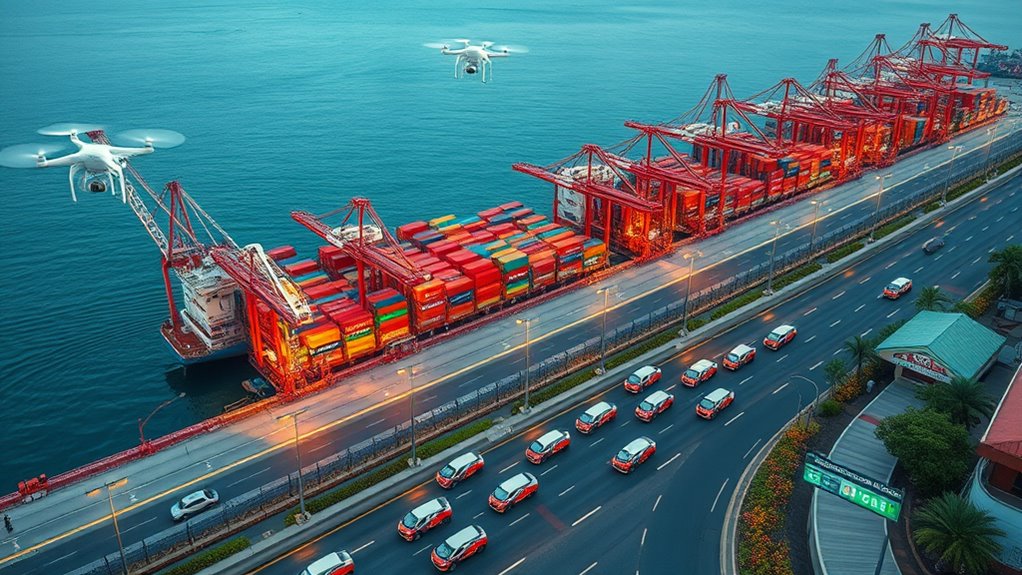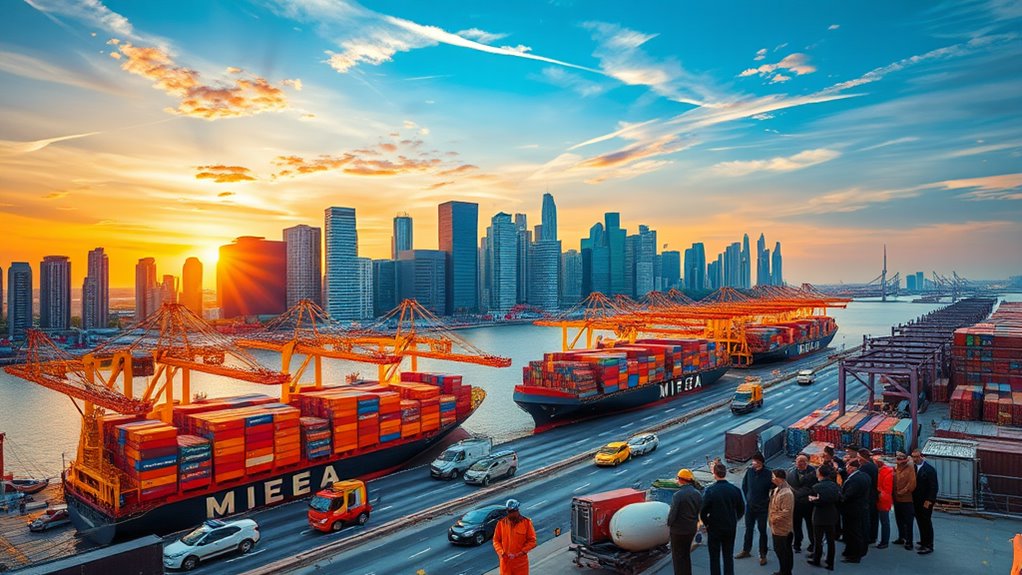Isn't it interesting how just when you think you've got the logistics game figured out, everything changes? Singapore's logistics sector is on the brink of an exciting transformation. With global supply chains shifting and new technologies emerging, there's so much to investigate. From infrastructure upgrades to a skilled workforce, these changes are paving the way for growth. Curious about how these shifts could impact Singapore's future? Let's break it down together!
Resilience in Supply Chains: The Shift to Southeast Asia
As global manufacturers rethink their strategies, many are finding Southeast Asia to be an exciting new frontier.
You're witnessing a massive shift as over 90% of companies plan to redesign their supply footprints. Why? It's all about supply diversification! With manufacturing costs up to 15% lower than in China, businesses are flocking to Southeast Asia.
Exports to the US have skyrocketed by 65% since 2018, showcasing the region's growing trade power. Plus, regional cooperation through ASEAN policies and trade agreements makes relocating a breeze.
This isn't just about saving money; it's about building resilient supply chains that can withstand future shocks.
Infrastructure Investments Driving Logistics Efficiency
Singapore is ramping up its infrastructure investments, and that's exciting news for the logistics sector!
With upgrades like the Tuas Port, set to be the largest fully automated port by the 2040s, you can expect logistics optimization like never before. Handling 65 million TEUs annually will make trade smoother and faster.
Plus, the Changi Airport expansion elevates air cargo capacity to 5.4 million tonnes, solidifying Singapore's position as Southeast Asia's air cargo hub.
The Changi Airport expansion boosts air cargo capacity to 5.4 million tonnes, reinforcing Singapore as Southeast Asia's air cargo leader.
These infrastructure upgrades aren't just about size; they improve complex cargo operations, ensuring the biggest ships can dock with ease.
The government's S$200 million digitalization push is another cherry on top, driving efficiency and competitiveness in logistics.
Prepare for a wave of change!
The Rise of Advanced Technologies in Logistics

With all these exciting infrastructure upgrades, the logistics sector is ready for a tech transformation! Advanced technologies like AI, machine learning, and warehouse robotics are set to change the game. You'll see automation benefits that streamline operations, elevate productivity, and meet rising client demands. Plus, the Singapore government's S$200 million investment shows they're serious about technology integration.
Here's a quick look at how these technologies are impacting logistics:
| Technology | Benefits | Future Impact |
|---|---|---|
| AI | Improved decision-making | Predictive analytics |
| Warehouse Robotics | Increased efficiency | Faster fulfillment |
| Machine Learning | Enhanced inventory management | Reduced costs |
Get ready for a more efficient logistics world!
Workforce Development: Building Talent for the Future
In the modern fast-paced world, it's crucial to stay ahead, especially in logistics. Singapore's workforce development focuses on skills improvement to create 700 new supply chain management jobs by 2025. This is super exciting!
The SCM Jobs Transformation Map lays out clear strategies to align your skills with what the industry needs. With nearly 20 SCM-related courses available, around 3,600 graduates are ready to engage in the logistics field every year.
The SCM Jobs Transformation Map aligns skills with industry needs, preparing 3,600 graduates annually for the logistics field.
Plus, Career Conversion Programmes (CCPs) help many individuals shift smoothly into these roles. The government's investment of over US$750 million annually in ongoing education shows their commitment to building solid career pathways.
It's all about preparing for a future where you can thrive in logistics!
Global Recognition Enhancing Singapore's Logistics Appeal

As global logistics continues to evolve, Singapore stands out as a guiding light of excellence. You'll see that it ranks high in logistics indices and hosts 22 of the top 25 global third-party logistics providers. This makes it a hotspot for major players.
The government's support fuels global partnerships and trade agreements, creating a robust ecosystem. Plus, groundbreaking programs like the Overseas Markets Immersion Programme improve the talent pipeline, keeping Singapore at the forefront.
With a strong emphasis on technology and digital transformation, this city-state is shaping the future of logistics. You can feel the energy here—it's not just about moving goods; it's about leading a revolution in global supply chains!
Navigating Geopolitical Challenges in Supply Chain Strategies
Steering geopolitical challenges in supply chain strategies is more vital than ever. You can't ignore the shifting landscape; over 90% of manufacturers are redesigning their supply footprints.
It's all about risk management now. By diversifying production and forging strategic partnerships, you can navigate these turbulent waters. Southeast Asia, with lower manufacturing costs and an increase in foreign investment, is emerging as a solid alternative to China.
Plus, Singapore's excellent infrastructure is a game-changer. It's like having a secret weapon for efficiency!
Conclusion
So, there you have it! Singapore's logistics sector is on the brink of something huge, thanks to these six global shifts. With smart investments, tech advancements, and a skilled workforce, it's set to lead the way in the supply chain game. But wait—there's more! As the world keeps changing, who knows what exciting opportunities lie ahead? Stay curious and keep an eye on Singapore; you won't want to miss what's coming next!